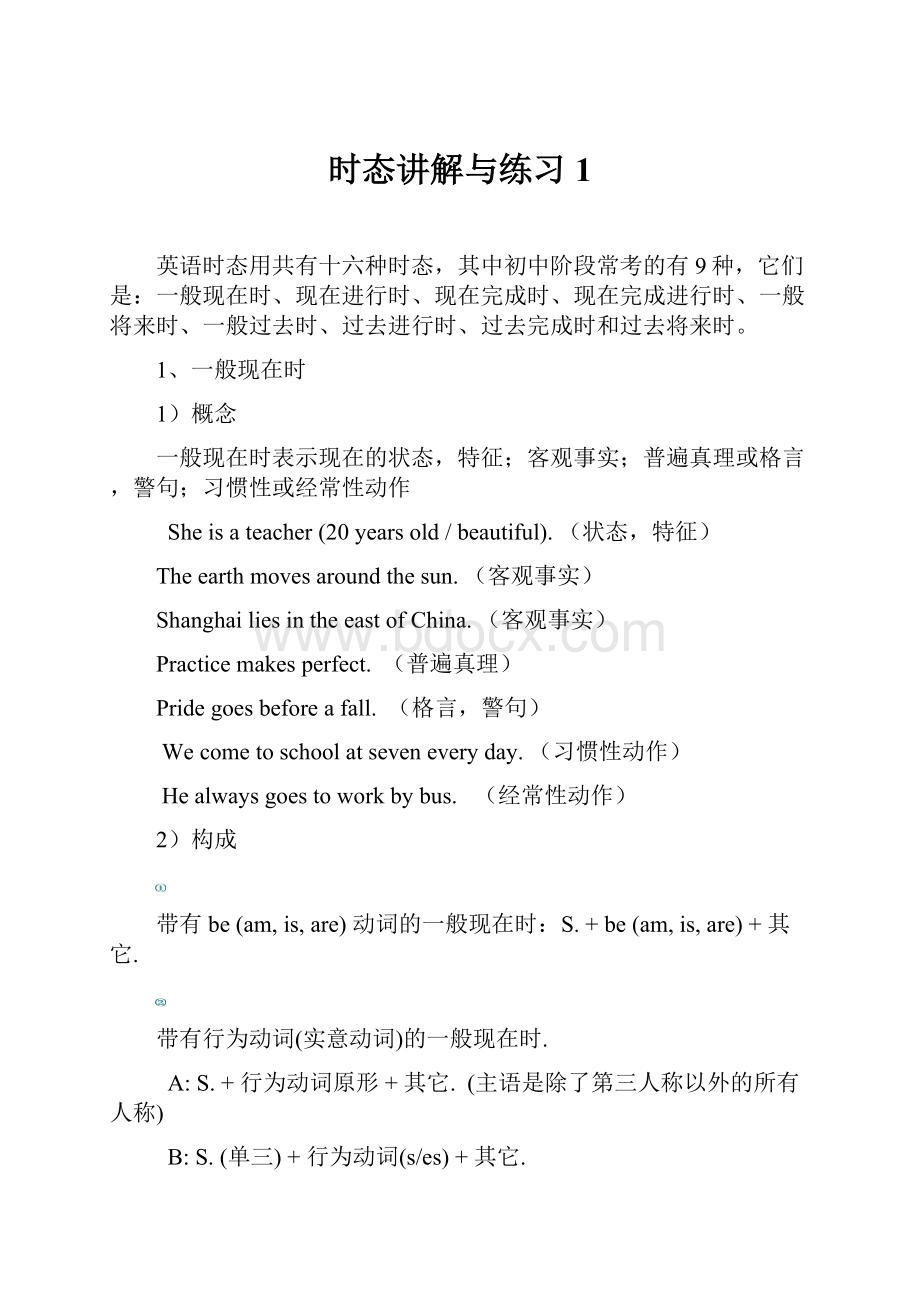时态讲解与练习1.docx
《时态讲解与练习1.docx》由会员分享,可在线阅读,更多相关《时态讲解与练习1.docx(38页珍藏版)》请在冰豆网上搜索。

时态讲解与练习1
英语时态用共有十六种时态,其中初中阶段常考的有9种,它们是:
一般现在时、现在进行时、现在完成时、现在完成进行时、一般将来时、一般过去时、过去进行时、过去完成时和过去将来时。
1、一般现在时
1)概念
一般现在时表示现在的状态,特征;客观事实;普遍真理或格言,警句;习惯性或经常性动作
Sheisateacher(20yearsold/beautiful).(状态,特征)
Theearthmovesaroundthesun.(客观事实)
ShanghailiesintheeastofChina.(客观事实)
Practicemakesperfect.(普遍真理)
Pridegoesbeforeafall.(格言,警句)
Wecometoschoolatseveneveryday.(习惯性动作)
Healwaysgoestoworkbybus.(经常性动作)
2)构成
带有be(am,is,are)动词的一般现在时:
S.+be(am,is,are)+其它.
带有行为动词(实意动词)的一般现在时.
A:
S.+行为动词原形+其它.(主语是除了第三人称以外的所有人称)
B:
S.(单三)+行为动词(s/es)+其它.
3)一般现在时的用法
常与often,always,usually,sometimes,hardlyever,never,everyday(month,week,year),onSundays,onceaweek等表示频度的时间状语连用。
Ileavehomeforschoolat7everymorning.
Jackbrusheshisteethtwiceaday.
Thestudentsborrowbooksfromthelibraryeverymonth.
ItoftenrainsheavilyinSeptember.
Youalwayshandinyourhomeworklate.
Whatdoyouusuallyhaveforbreakfast?
Lisaneverwalkstowork.Sheoftendriveshercarthere.
在if,assoonas,until,when,before引导的状语从句中。
多用在以下结构中:
主句+将来时,从句+一般现在时
主句+过去时,从句+过去时
Ifitdoesn’traintomorrow,wewillgotothecinema.
I’lltellhimthenewsassoonas/whenhecomesback.
Itoldhimthenewsassoonashecamebackyesterday.
Hewon’tgotobeduntilhefinisheshishomeworktonight.
Hedidn’tgotobeduntilhefinishedhishomeworklastnight.
Babiescrawlbeforetheycanwalk.
*Helenalwaysmakessnowmenwhenitsnowsinwinter.
在宾语从句中,主句是过去时,但从句是表示客观事实时,从句谓语仍用一般现在时。
Shesaidthatlighttravelsfasterthansound.
Columbusprovedthattheearthisround.
其他使用一般现在时的句子。
Theregoesthebell.=Thebellisringing.
Herecomesthebus.=Thebusiscoming.
Hereyouare.
(按时刻表和日程安排好的事,多用一般现在时。
常用的动词有come,go,start,stop,leave,arrive)
Thetrainleavesatnineinthemorning.
Theplaneleavesat10:
30andarrivesinParisat11:
30.
Theferrysailsat10a.m.everyday.
4)练习:
把下列句子变成否定句或疑问句。
1.Theygetupearly.(否定)
…………………………………………………………………………………………………………………………….
2.Sueworksfrom9to5.(疑问)
……………………………………………………………………………………………………………………………..………
3.Schoolfinishesat2o’clock.(否定)
……………………………………………………………………………………………………….………………….…….………
4.Theydotheirhomeworkintheafternoon.(疑问)
……………………………………………………………………………………………………………….………………....……
5.Laragoestoprivateclasses.(否定)
………………………………………………………………………………………………………………….……………….……
6.Timusesthecomputertodohishomework.(疑问)
………………………………………………………………………………………………………….…………………………..…
7.Ilistentotheradiobeforegoingtobed.(否定)
……………………………………………………………………………………………………….……………………..…………
对划线部分提问。
1.Stellafinishesherworkat7pm.
………………………………………………………………………………………………………………………………..….…….
2.Petertakesthebustoschooleverymorning.
………………………………………………………………………………………………………………………………………..…
3.Myoldersisterhelpsmumdothecleaning.
…………………………………………………………………………………………………………………………………..…...
4.Davegoestotheparkwithhisfriends.
…………………………………………………………………………………………………………………..….……………..…
5.Shestudiesherlessonsafterlunch.
…………………………………………………………………………………………………………………………………………
6.Hedoesn’twatchTVwhenhehastostudy.
……………………………………………………………………………………………………………………………….………..
7.Theymeettheirfriendsinthepub.
………………………………………………………………………………………………………………………………..………
8.Shedoesthecleaningtwiceaweek.
…………………………………………………………………………………………………..…………………………………..
根据正确的时态,用以下的动词填空。
go–start–have–finish–listen–get–meet-make-wake–leave
arrive–buy-watch
Mary_______upat7.She________ashowerbeforebreakfast.Afterbreakfast,she_________dressedand_________thehousefortheoffice.Mary_________workat9andusually__________at5.At12,she__________herfriendsatthecafeteriatohavelunch.Afterwork,she___________somefoodatthesupermarket.She__________homeat6and__________dinner.AfterdinnerMary_________TVor_________totheradio.She__________tobedat11.
2、现在进行时
1)概念:
表示现在正在进行或某个时间点正在进行的动作。
2)构成:
be+V.ing(现在分词)
一般动词直接+ingtalk–talkinggo–goingmix-mixing
以不发音e结尾的词,去e+ing
come-comingtake-takinggive–givinghave–havinglive-living
注意:
die-dyinglie-lyingtie–tying
重读闭音节词,要双写最后一个辅音字母+ing
runningstoppingswimmingbeginningcuttingdropping
planningkiddingpreferringbabysitting
3)现在进行时的用法
在句中出现now,atthemoment,atpresent,rightnow,Look!
Listen!
等词或词组时要用进行时。
Sandraisplayinggolfintheparkrightnow.
Lisaisdrinkinganicecupofteaatthemoment.
Look!
Benisexercisingatthegym.Hewantstokeepfit.
Bequiet!
Thebabyissleeping.
Stopshouting!
Iamtryingtodomyhomework
用进行时问,进行时答;或根据上下文判断。
--Whatareyoudoing?
--Iamreading.
PeterishittingDavewithapillow.Heisareallynaughtyboy.
Let’sgohome!
Wearenothavingagoodtimeattheparty.
有特定时间时,要用进行时。
It’s7:
30a.m.Iamhavingbreakfast.
动词go,come,leave,arrive,move,fly,travel,die(dying)可用它们的进行时态来表示一般将来时。
I’mvisitinghimnextweek.
She’scomingtomorrow.
TheyareleavingonFriday.
AnnistravellingtoParisnextweek.
ThevisitorsfromKoreaareleavingforBeijingsoon.
Iammovingtoanotherhousebecausethisoneistoosmall.
while引导的时间状语从句多用进行时。
TonyissleepingwhilehissisteriswatchingTV.
4)练习:
写出下列动词的现在分词形式。
study__________watch__________run__________sit___________
fly____________ask___________lie__________dance_________
see___________listen__________cook__________ride__________
jog___________stop___________win__________travel_________
put___________write__________buy__________begin__________
say___________leave__________make__________get__________
eat___________swim___________cut___________drive_________
die___________shop___________tie___________skate_________
把下列句子变成否定句或疑问句。
1.Anniswritingtoherparents.(疑问)
……………………………………………………………………………………………………………………….…………………
2.StellaandIarewatchingthenewsonTV.(否定)
……………………………………………………………………………………………………………………………..…………
3.Heishavingarestinhisbedroom.(疑问)
………………………………………………………………………………………………………………………….………
4.Mumismakingdinnerinthekitchen.(否定)
…………………………………………………………………………………………………………………..………..…
5.JohnandPeterareridingtoschool.(疑问)
…………………………………………………………..……………………………………………………………….……
6.Theyarevisitingtheirgrandparents.(否定)
………………………………………………………………………………………………………………………….……
对划线部分提问。
1.Mymotherislookingforhersunglasses.
………………………………………………………………………………………………………………….………….
2.Theyaremeetingtheirfriendsat10pm.
………………………………………………………………………………………………..……………………………
3.Daveisphoninghisgirlfriendtogotothezoo.
………………………………………………………………………………………………..……………………..……
4.Pamisbuyingapresentforherdad.
……………………………………………………………………………………….………………………………………
5.Mysisteristakingthedogforawalk.
……………………………………………………………………………………………………………………….………
6.Heisn’tcomingwithusbecausehe’sbusy.
……………………………………………………………………………………………………………………….……
7.I’mgoingtothepooltomorrowmorning.
…………………………………………………………………………………………………….………………..………
8.Sheistravellingbyplane.
…………………………………………………………………………………………………………………….…………
3、一般将来时
1)概念:
表示将来发生的动作或存在的状态。
Iwillcallyouthisafternoon.
Somedaypeoplewillgotothemoon.
Heisgoingtotravelaroundtheworldnextyear.
2)构成
begoingto+动词原形
will(shall)+动词原形
be+V.ing(现在分词)
3)一般将来时的用法
tomorrow,thedayaftertomorrow,nextweek(month,year,Sunday),thisevening,tonight,in+一段时间(inafewdays),inthefuture,soon,beforelong,someday(某一天)等连用。
MaryandLindaaregoingtopickupapplesthisafternoon.
Weshallgofortheconcerttomorrowevening.
OurteacherwillgiveusanEnglishtestnextweek.
Mybosswillbebackintwodays.
begoingto+V.--计划,打算,考虑,准备好要做的事情,或有什么迹象表明要发生的事
will(shall)+V.--未经事先考虑的事
Heistootired,soheisgoingtochangehisjob.
Lookatthatbrokentileonthewall.Itisgoingtofalldownsoon.
Thereissomebodyatthedoor.Iwillgoandopenit.
Mygrandfatherwillbe80yearsoldnextmonth.
动词go,come,leave,arrive,move,fly,travel,start,return等可用进行时表将来。
ThevisitorsfromKoreaareleavingforBeijingsoon.
Iammovingtoanotherhousebecausethisoneistoosmall.
WearevisitingSuenextweekend.
They’regoingtothezootomorrow.
beto+V.表示有职责,义务,可能,约定
beaboutto+V.表示马上,很快作某事。
Heistocomeheretonight.(他今晚即将来这。
)
Thenewtermisabouttobegin.(新学期即将开始。
)
我们使用以下这些结构来表示对将来的预测:
I'msure,Ithink,Iexpect,Ihope,Isuppose,I'mafraid,Ipromise,probably,perhaps,possibly,surely.
Sueistrainingveryhard.I’msureshewillgetanewworldrecord.
I’mafraidIwillfailthemathsexam.
Tellmeyoursecret.IpromiseI’llkeepit.
在if,assoonas,until,when,before引导的状语从句中。
多用以下结构中
主句+将来时,从句+一般现在时
I’llphoneJohnifyougivemehisnumber.
IfPeterarriveslateatthemeeting,hisbosswillbeveryangrywithhim.
表示委婉请求或建议
ShallI(we)…?
/Would(Will)youplease…?
ShallIhaveanothercake?
I’mstillhungry.
Willyoupleaseopenthedoor?
It’stoohothere.
Wouldyoupleaseturndowntheradio?
It’stoonoisy.
4)练习:
用所给词的正确时态填空。
1.I…………………………(take)mygirlfriendtothetheatretomorrow.
2.Myfriends……………………………(play)atWimbledon(温布尔顿)nextsummer.
3.--How…………………you………………………(get)tothepartytonight?
--I……………………(go)therebycar.I………………………………(drive)myself.
4.Maryoften………………………………(have)apicnicwithherfamilyonSunday.
5.Tom……………………..………(go)tothedentistintheafternoon.
6.Thesalesusually……………………..…………(start)onJuly20th.
7.Dan…………………………(meet)hisfriendsattheswimmingpoolat4.
8.In